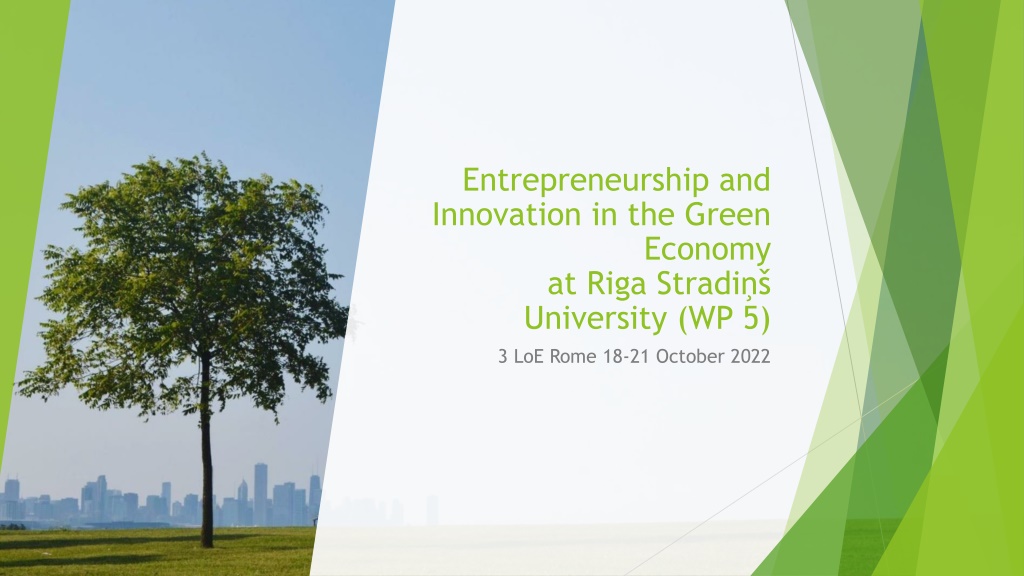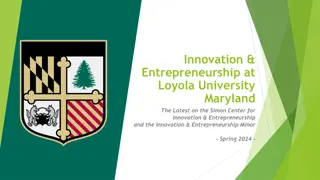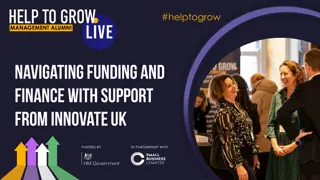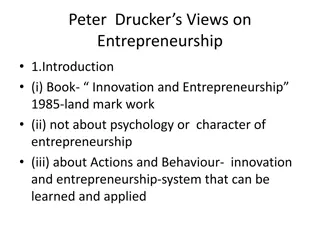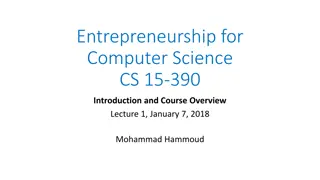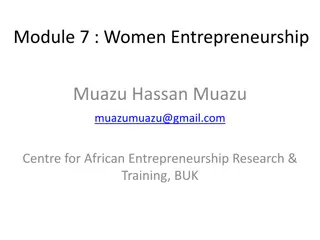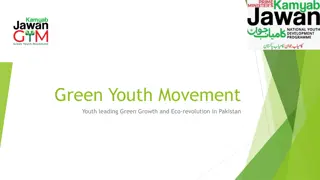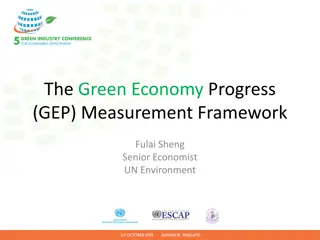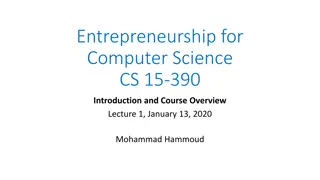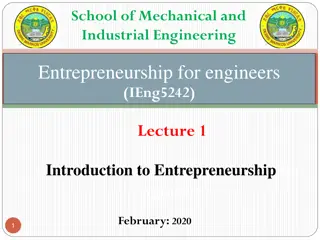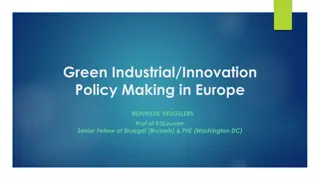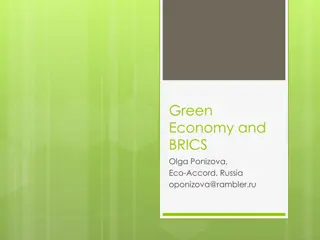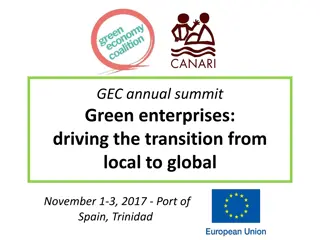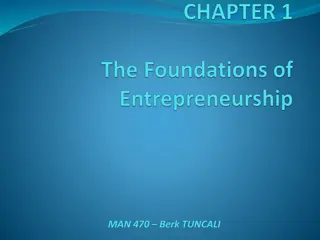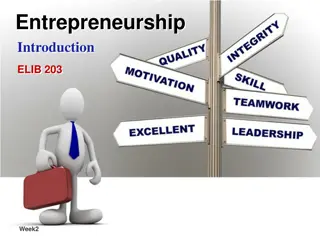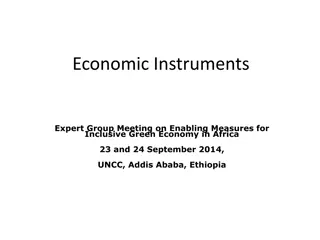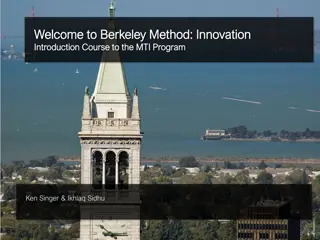Entrepreneurship and Innovation in the Green Economy Conference Overview
This overview highlights the program's focus on green economy innovation, educational policies, and collaboration with international partners. It delves into Latvia's challenges and the significance of green innovation entrepreneurship in driving radical changes. The narrative extends to the European Skills Agenda, showcasing the promotion of green economy and innovation within the EU and Latvia. It also presents examples from Germany, France, Finland, and Belgium, emphasizing their educational institutions. The document further explores Latvia's position in sustainable development, emphasizing its comprehensive framework and alignment with the SDGs.
Download Presentation

Please find below an Image/Link to download the presentation.
The content on the website is provided AS IS for your information and personal use only. It may not be sold, licensed, or shared on other websites without obtaining consent from the author. Download presentation by click this link. If you encounter any issues during the download, it is possible that the publisher has removed the file from their server.
E N D
Presentation Transcript
Entrepreneurship and Innovation in the Green Economy at Riga Stradi University (WP 5) 3 LoE Rome 18-21 October 2022
The Concept of the Programme First, understanding the architecture and essentials of approaches to Green economy innovation by international institutions and governments, experts, and educators which made up the green entrepreneurship orientation and needs for educational policies and programmes reflecting new trends in labour markets and business environment, development of new knowledge and skills Second, information on some of issues faced in Latvia related to practices and policies addressed in education. As the realm of education policy is very broad, we focused on five areas: socio-economic situation and labour market needs green entrepreneurship and innovation job -related training in EU and Latvia development of a bachelor s degree programme/subprogramme and cooperation with business promotion of the programme further projects on joint programmes with international partners
The Concept of Green Innovation Entrepreneurship has an important role in delivering more radical green innovations that challenge existing firms and business models Green Entrepreneurship Green Innovation Green Social Performance Green Economic Performance Green Environmental Performance
European Skills Agenda HEIs. Importance and promotion of green economy and innovation in the context of EU and Latvia Sustainable development and European Green Deal The Next GenerationEU Recovery plan RePower Europe plan
EU and International examples/experiences Germany- Hamburg Educational Institutions France- Lyon Business School Foundation Finland Satakuna University Belgium- Vlerick Business School
Latvia s Position in Sustainable Development (SD) A well-developed and comprehensive framework for sustainable development- it is defined by law and adopts the principle of vertical (hierarchical) and horizontal co-ordination of planning documents The SD Strategy of Latvia until 2030 includes long-term priorities, goals, action lines, is consistent with the SDGs- it is based on a capital approach to SD with focuses on ecological limits, with an emphasis on the correlation between environmental and economic systems and wealth
Several areas for action have been identifies: increasing productivity of the economy, including through more efficient use of resources and larger investment in R&D and R&N improving labour market performance improving the health care and social welfare systems improving service provision to low-density areas, including road infrastructure, public transport and housing adapting to climate change, reducing GHG (greenhouse gases) emissions and promoting wider use of renewable energy sources Latvia s Position in Sustainable Development (SD)
Demography the population is decreasing more rapidly - by 0.76%in 2020 compared to 0.64% 2019, including a decrease of 0.59% due to negative natural growth and 0.17% due to migration In 2020 the lowest birth rate in the last hundred years was registered- 17.6 thousand children were born in Latvia The HE system has to adjust to two forthcoming changes arising from demographic changes a decrease in total enrolment volume and a change in the age structure Conclusion Opening up new types and models in education could be part of the solution- a trend of vocational education and professional educational programmes at HE institutions
The objectives of the programme development concept The importance of green entrepreneur orientation and innovation in education Exchange of practical experiences in Latvia and other partner countries in 3LoE Interrelations between Labour market Economy Demography Education- the needs for updates (OECD, WEF)
Knowledge Knowledge Explanation K-1 Able to demonstrate specialized knowledge in international business and entrepreneurship and innovation in the green economy and management Able demonstrate a critical and current understanding of concepts and regularities in the economy and management of entrepreneurship and innovation in the green economy Able to demonstrate in-depth theoretical and practical knowledge of the theory, methods of analysis and tools in the economic analysis of international business, entrepreneurship and innovation in the green economy and management K-2 K-3 K-4 Recognizes the development of necessary knowledge and skills, including social digital skills, and the need for self-growth in the global environment of international business, entrepreneurship and innovation in the green economy and management
Skills Skills S-5 Explanation Able to identify trends and find creative solutions using a scientific approach to the changing issues of international business, entrepreneurship and innovation in the green economy and management S-6 Able to gather information independently and analytically from various sources, critically evaluate it and present it correctly Able to formulate information in a structured analytical and concise manner in writing, to express himself precisely and to discuss arguments in general and specialized aspects of international business, entrepreneurship and innovation in the green economy and management S-7 S-8 Able to use appropriate practical and theoretical knowledge and skills in professional business management and research (scientific) work, being aware of the impact of their activities on the environment and society
Competences Explanation Competences C-9 Able to plan business processes and resources, including time, work, personnel, talent, finance, infrastructure C-10 Able to participate in the development of international business and start-ups in a global environment, offering innovative solutions to industry problems C-11 Able to demonstrate an understanding of and application of professional ethics and culture, including intercultural understanding and respect
Duration 6 semesters Structure of the programme in years and ECTS 1.semester 20 KP (24 ECTS)- general courses 2.semester 20 KP (24 ECTS)- general and specific courses 3.semester 20 KP (24 ECTS)- studies at work specific courses 4.semester 20 KP (24 ECTS)- studies at work- specific courses 5.semester 20 KP (24 ECTS)- studies at work specific courses 6.semester 20 KP (24 ECTS)- Bachelor Thesis+ methodological seminar 7 semesters or 3,5 academic years- in case of distance learning ( after 3 years completed graduates can apply for additional courses The result- a Certificate to the Diploma Bachelor in Social Silences
Examples of Courses Specialised General Sustainable Social Entrepreneurship Applied Microeconomics and Mathematics in Business Social Innovation. Design and Impact Assessment Applied Macroeconomics and Statistics Process Management for Sustainable Business Development Basics of Accounting and Finances Green Start-ups and Scale-ups International Business and Marketing Green Entrepreneurship and Green Innovation for SEMs The Business of Society-Implications of Digital Transformation Essentials and Advances in Digital Innovation and Entrepreneurship
In conclusion
Progress Fruitful discussions on the programme ideology with potential teachers and the university administration Mapping of the programme s content Understanding of steps and duration of the drafting and licencing of the programme/subprogramme
Challenges Educational system in Latvia- no dual programmes Cooperation with employers- to wider the existing network Languages for studies: LV; EN International cooperation Human resources
Thank you! RSU Team PP11/3LoE
